Text
you kind of do have to let multiple layers of meaning and metaphor coexist rather than claiming one is the true reading if you want to get fucking anything out of art
22K notes
·
View notes
Photo
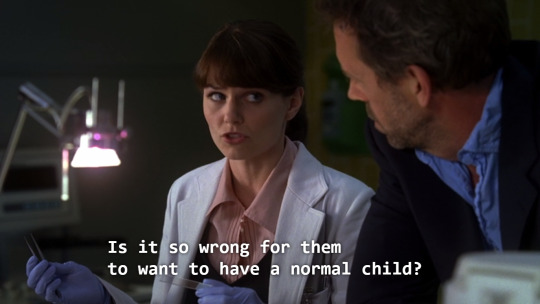

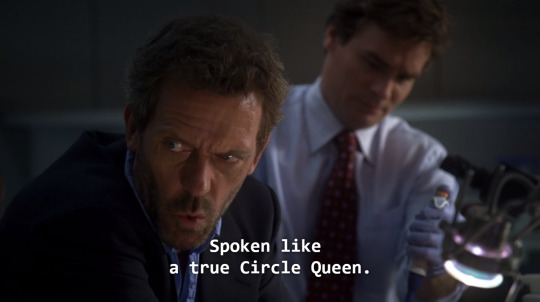


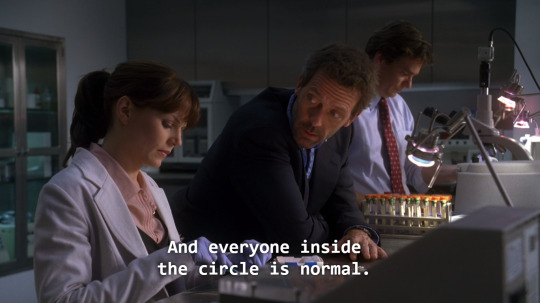

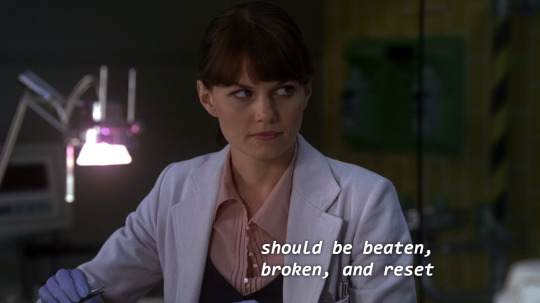
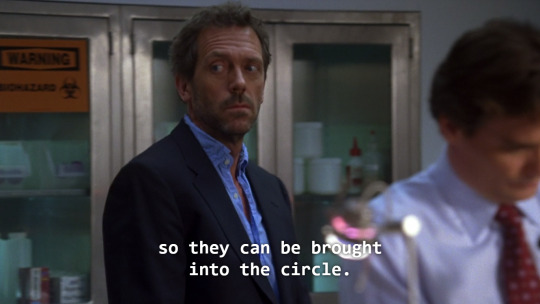
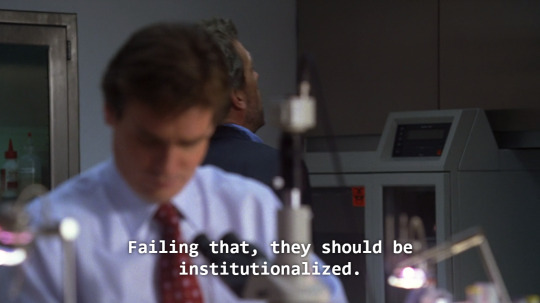
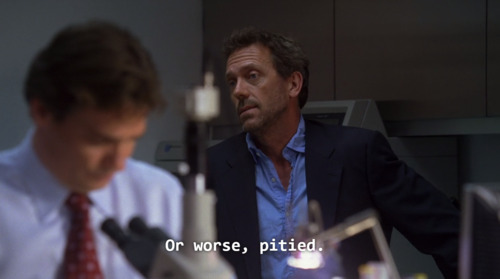
this honestly just came out of left fucking field i would have never expected to hear anything like this in this show. consider me Pleasantly Surprised tbh
379K notes
·
View notes
Text
you kind of do have to let multiple layers of meaning and metaphor coexist rather than claiming one is the true reading if you want to get fucking anything out of art
22K notes
·
View notes
Text
listen. i know it's not 2014 anymore and i know it's just a throwaway line and that the russo brothers didnt intend for marvel action blockbuster captain america the winter soldier to become the tragic gay love story that never was but man. having steve say "it's kind of hard to find someone with shared life experience" in a conversation about romantic relationships right before the bucky reveal is so cruel. it's not just about steve and bucky obviously having the shared experience of being "out of time," it's the fact that they've both been stripped of their humanity in opposite directions. steve is a legend, he is an american hero and a national icon before he is a human being the same way that bucky is a weapon and a killing machine before he is a human being. steve knows that anyone who falls in love with him in the 21st century fell in love with captain america first, and that's just not him. but then the one person who knew him first and knew him best and loved him (not captain america, that little guy from brooklyn) so much he died for it is alive, impossibly. and it's a miracle because he's back and it's horrific because he's back under the worst possible circumstances. but to steve, the winter soldier is worth tearing the world apart for because he's always been bucky first. they find each other and suddenly they're human again. and maybe, despite it all, being "out of time" becomes a blessing, because in this century they'd finally be allowed to love each other the way they've always wanted to. like real people do.
like. no. the captain america trilogy isn't about two queer men traumatized and alienated by war and modern life rediscovering and reclaiming their humanity through their love for each other. but. i mean. it couldve been
32K notes
·
View notes
Text
idk who needs to hear this but when your english teacher asks you to explain why an author chose to use a specific metaphor or literary device, it’s not because you won’t be able to function in real-world society without the essential knowledge of gatsby’s green light or whatever, it’s because that process develops your abilities to parse a text for meaning and fill in gaps in information by yourself, and if you’re wondering what happens when you DON’T develop an adult level of reading comprehension, look no further than the dizzying array of examples right here on tumblr dot com
209K notes
·
View notes
Text
Armand loves so completely and with so much devotion that literally no one can match his freak and then he gets disastrously upset when people won’t hollow themselves out with carving knives and hand him their insides as proof of their devotion and then everyone has to suffer because he doesn’t understand that’s not what love is to most people. He went to the trouble of bringing all the silverware and now no one wants to carve out their hearts and give them to him even though they said they loved him? And here he was, ready to serve up his insides on a platter, only to be met with the coldness of this so-called lover. Liars, all of them.
7K notes
·
View notes
Text
The thing is, until you get past the mindset of "justice=punishment" you will never be able to create lasting change. We have actual proof that punitive justice creates more crime and makes criminals more violent. We have actual proof that rehabilitation reduces crime and recidivism. But some of y'all are so stuck on this idea that the wrongdoer must be punished for justice to be done that you will choose sating your need for revenge over actually moving toward a better world every time. And that's sad!
63K notes
·
View notes
Text

Roland Barthes, The Pleasure of the Text, trans. Richard Miller
8K notes
·
View notes
Text
every single farmer i ever worked for knew exactly how they were being occupied and manipulated by huge agriculture corporations like monsanto. every line cook ive ever been coworkers with knew exactly how they were being taken advantage of. the working class doesnt need theory to understand their material world. they need the money that will let them organize and they need the space to organize. they need material support. not dialectical. stop telling everyone to read a fucking book. get them health insurance + dental then well talk.
27K notes
·
View notes
Text
eclectic taste (not to be confused with good taste) is the only thing you actually need to be a good artist. i don't care if you like the right things, i literally only care abt the multitude of experiences and practices you have ingested.
20K notes
·
View notes
Text
newwwwww essay on how i feel house of the dragon succeeds as a piece of anti-war tv ! get into it ⬇️
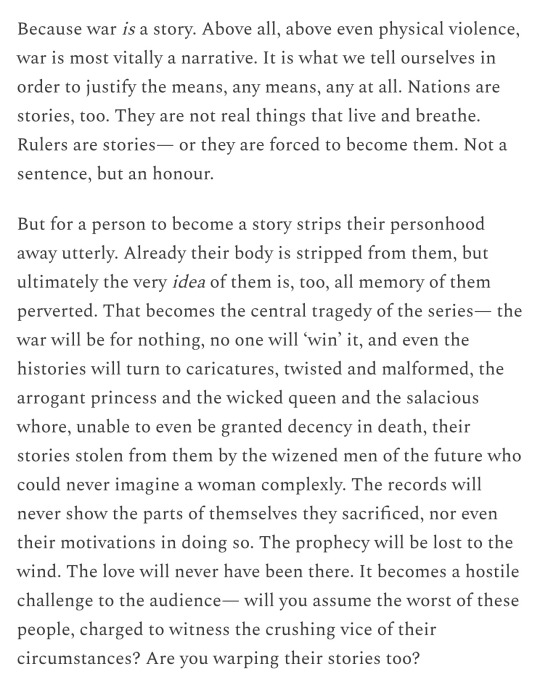
177 notes
·
View notes
Text
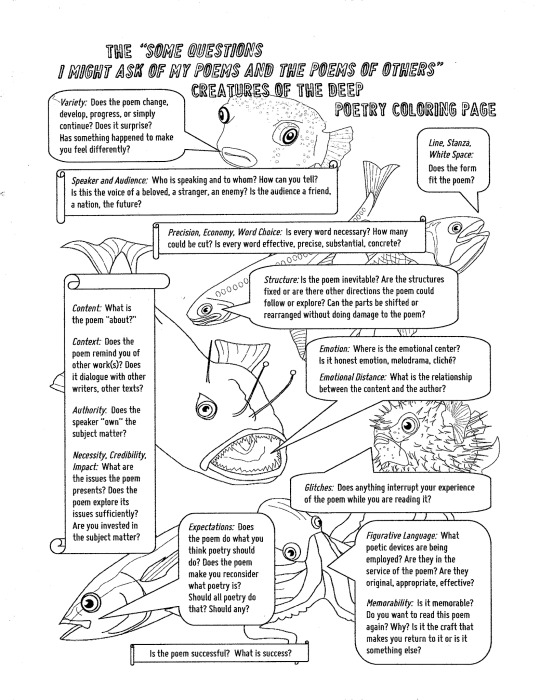
richard siken posted this coloring worksheet today and i think it has some pretty good questions for engaging with poetry. and also deep sea fish :)
2K notes
·
View notes
Text



INTERVIEW WITH THE VAMPIRE 2.08 “And That’s the End of It. There’s Nothing Else” – The Gospel According to Jesus Christ, José Saramago
1K notes
·
View notes
Text
every narrator is unreliable bc ontological truth is non-existent and therefore unattainable
9K notes
·
View notes
Text
I finished Ursula K Le Guin’s The Farthest Shore yesterday, and it got me thinking about two things:
1) The relationship between truth and meaning.
2) The wisdom of accepting death.
The conflict of the book is established when it is discovered that people have lost their connection to the “true speech”, the language of creation, which means that wizards can no longer use magic, but also that everyone falls into nihilism, listlessness, and paranoia. People retain their regular language, but the language of magic is lost, and so they lose their grip on reality. They see everything as flat, without any transcendence in anything. Nothing is more significant than anything else, and so nothing is worth doing. People keep talking, but none of it means anything real.
The cause of this is someone trying to escape the fear of death by dying and coming back immortal, leaving a tear in the world that magic leaks out of. The fact that they have to first die to find immortal life suggests that death and immortality are in a way the same thing, and that this deconstruction is the cause of the spread of nihilism. The necromancer is able to send out a message to people’s dark sides, causing this change in them:
By denying life you may deny death and live forever!
This is reflected in the fact that the souls of the dead show an even more extreme embodiment of the emptiness and stillness experienced by those seduced by the message. The tear in the world is blurring the distinctions between life and death, and calling for people to hurry it along.
For Le Guin then, life is change and difference - rather like Octavia Butler’s message from Parable of the Sower that ���God Is Change”. Maybe the key part of Butler’s poem for this though is “The Only Lasting Truth Is Change.” Seeking immortality is sort of denying reality. Le Guin describes each individual life as a wave on the ocean, and claims that seeking immortality would be like making the entire ocean one wave, so that it grows still. In other words, life cannot exist without other lives, and without a chance of ending. A single life that totalises all would be indistinguishable from death.
I’m with her on the first point, that a changeless life would be indistinguishable from death. Experience is formed through interaction, which inevitably changes both parties. This is ancient knowledge, which Le Guin no doubt gets from her passion for Taoism, but my favourite exposition is Donna Haraway’s Situated Knowledges. But if life is always changing, always unfinished, why could there not theoretically be an eternal life which does not totalise, which accepts its mutability?
I think here is where we run up against the tension between Le Guin’s commitments to true language on on side and contingency on the other. Nietzsche is famous for having pointed out that language is a host of metaphors. Derrida then took this further to point out that no word is self-contained, rather its meaning is dependent on so many others that it can never be pinned down perfectly to mean just one thing for certain. This includes the self. It stops and starts when we’re knocked unconscious, and its altered with every experience, every exchange of atoms. In a sense we die a lot - if we thing of ourselves as a being, rather than an emergent property of various processes. We can’t be perfectly described with a word, because we aren’t a constant thing anyway, irrespective of that final death.
But this is kind of a moot point as Le Guin’s story is concerned. Few of us ever actually seek immortality. And Le Guin is right to frame it as an impossible task. It plays a symbolic role for the equally, perhaps even more, impossible task of seeking control, constancy, solidity. Nothing is constant - The Only Lasting Truth Is Change. But for me this just makes the final change of death easier to accept, as just one more change that will leave the previous version of myself behind - only this time there won’t be a recognisably new version to take its place.
There is definitely a difficulty in accepting the indefinite fuzziness that comes to things when you look at them like this though, that can lead to the nihilism Le Guin was so afraid of. I think Le Guin answers this rather well though, when she says that we cannot help but do everything we do, want everything we want, feel everything we feel. We can’t actually avoid caring about things, especially if we throw ourselves into them. We don’t have to justify what we care about based on some sort of metaphysical truth, as if we could ever be certain of that - we just have to accept the inclinations given to us by the universe and act on them in a balanced way to make ourselves content. Don’t rationalise your feelings through strict force of will, pay attention to them and what the good asks of you. That’s actually from a different anarcha-feminist writer - Simone Weil - but it fits!
90 notes
·
View notes




